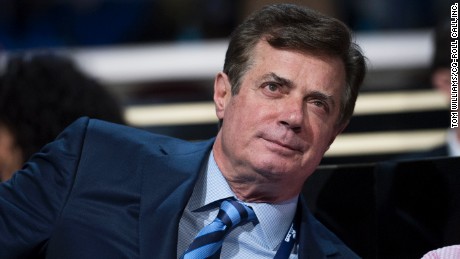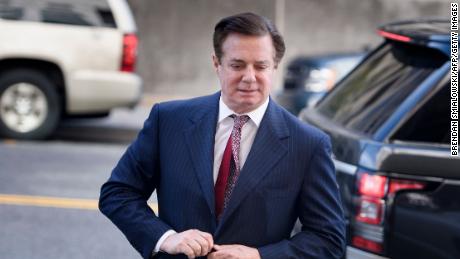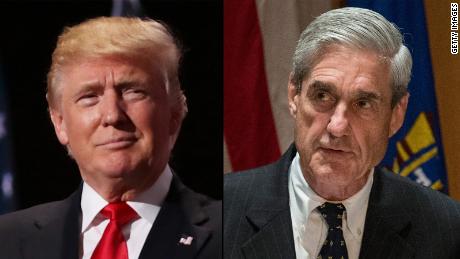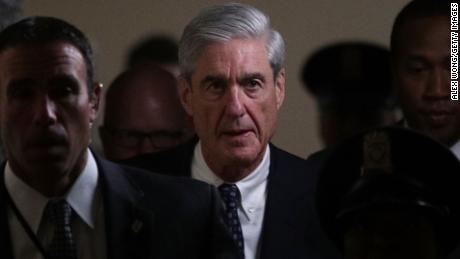(CNN)The biggest test of special counsel Robert Mueller's investigation into Russian interference in the 2016 presidential election begins Tuesday with the trial of Donald Trump's former campaign chairman, Paul Manafort.
The trial on Manafort's financial dealings will hang over the White House and show just how deeply federal authorities have looked into the private business of Trump associates.
It comes as the President continues to rail against Mueller's investigation, calling it a "witch hunt," and some congressional Republicans are looking to impeach the Justice Department official overseeing the Muller probe, Deputy Attorney General Rod Rosenstein. Trump weighed in on the Mueller probe Tuesday morning, reiterating a defense made by his attorney Rudy Giuliani that "collusion is not a crime," even though actions such as conspiracy can be criminal.
One year ago to the month, federal agents barged into Manafort's Alexandria, Virginia, apartment under a search warrant. They took dozens of hanging file folders, bank statements, discs, memory cards and computer hard drives, and a watch worth several thousand dollars from the design house Bijan -- much of that evidence will be on display for the jury.
The trial in federal court in Alexandria, Virginia, is expected to last three weeks. Jury selection will begin Tuesday, with opening arguments likely later this week. Manafort is also scheduled to face trial in Washington, DC, on related charges in September.
The case against Manafort doesn't focus on his time as chairman of the Trump campaign in 2016. Manafort is charged with 18 violations of tax and banking laws. Prosecutors claim he hid millions of dollars in income from lobbying for Ukrainian politicians, all while failing to pay taxes and spending the money on US real estate and personal luxury purchases.
When his Ukrainian political work dried up in 2015, prosecutors say Manafort lied to banks to take out more than $20 million in loans. They accuse him of hiding his foreign bank accounts from federal authorities. Manafort also allegedly received loans from the Federal Savings Bank after one of its executives sought a position in the Trump campaign and administration, prosecutors say.
If found guilty, Manafort could face a maximum sentence of 305 years in prison.
Prosecutors have said publicly that possible collusion between Russia and the Trump campaign won't come up at trial. "I don't anticipate that a government witness will utter the word 'Russia,'" one prosecutor said earlier this month.
That hasn't kept the collusion question from seeping into the proceedings so far.
When the judge who will oversee the trial, Judge T.S. Ellis, first had a chance to meet with prosecutors and the defense in the case, he railed at the possibility that Mueller had skewered Manafort as a way to get to Trump.
"The vernacular is to sing," Ellis commented in May on one of Mueller's possible that perhaps investigators wanted Manafort to change his plea to guilty and agree to cooperate.
Prosecutors plan to call about 30 witnesses to testify against Manafort and show the jury hundreds of financial records, emails and photos. Five witnesses who wanted to avoid testifying have been given limited immunity in the case.
Manafort himself is unlikely to testify, lawyers who've watched the case say.
His attorneys are under a court order not to speak publicly about Manafort's legal issues and declined to comment for this story.
Manafort's tactics
His lawyers have spent the months since Manafort's indictment attempting to pick away at the prosecutors' case with almost no success. They've tried to cut away at the evidence Mueller collected and asked two courts to deny Mueller his power to bring the case. But two federal judges have left the cases against Manafort in place.
Manafort also separately tried for months to lift the house arrest bail condition a judge placed him under in October. At the moment he looked set to succeed, prosecutors accused him of witness tampering, and a judge in DC federal court sent him to jail. He has been housed first at a jail in rural Virginia and now at the jail in Alexandria, since mid-June. The public has seen Manafort only a few times in court since his lock up, including twice last week when his lawyers earned from Ellis a one-week delay to the trial's start.
In the lead up to the trial, several defense lawyers who have watched the case as outsiders say Manafort's defense strategy has been unclear -- even nonexistent.
"I haven't seen any indication of the strategy," said James McGovern, a white-collar defense lawyer in New York who has no connection to the case but previously worked alongside one of Mueller's prosecutors, Greg Andres. "It seems to me [prosecutors will] have a great deal of paper that could lead to one inescapable conclusion."
Despite the suspected strength of prosecutors' case, Manafort expressed an air of calm confidence in private conversations before he went to jail in June.
"Paul believes that he'll be found not guilty of all of these charges. I do not know the details as to why," one friend said. "He believes in the end that he'll be vindicated."
Since June, Manafort told friends on a recorded phone line from jail he had reviewed all of the documents in his case.
Charlie Black -- one of Manafort's former business partners in the 1980s at the famed lobbying shop Black, Manafort & Stone -- said he hadn't spoken to Manafort recently, but in their prior conversations Manafort never wavered on his innocence. Stone is a reference to Roger Stone, who is also under Mueller scrutiny.
"It's tragic for him and his family," Black said. "I just hope that he's innocent." Black has not been called to testify in the upcoming trial.
The key witness
Prosecutors are expected to call to the stand former Manafort deputy Rick Gates as a key witness. Gates was originally indicted alongside Manafort, in both DC and Virginia, after prosecutors accused him of helping his longtime colleague lie to accountants, banks and the federal government.
Mueller's team dropped the case against Gates in Virginia after he changed his plea to guilty in the related case in DC and agreed to cooperate with investigators. Gates at the time said the pressure on his family, a "circus-like atmosphere" around the case and the legal bills contributed to his decision to flip.
With Gates positioned to testify against Manafort, the prosecutors are likely to weave some human drama into what appears to be a fairly straightforward financial case that largely will rely on a paper trail.
"This isn't a case with surprises in it. It's not even a surprise who your central cooperator is. [It] will be painfully boring to watch," McGovern said. "Gates is gravy at this point."























